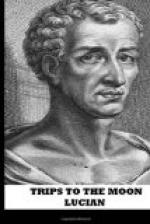Dr. Francklin prefaced his edition with a Life, written by a friend in the form of a Dialogue of the Dead in the Elysian Fields between Lord Lyttelton—who had been, in his Dialogues of the Dead, an imitator of the Dialogues so called in Lucian—and Lucian himself. “By that shambling gait and length of carcase,” says Lucian, “it must be Lord Lyttelton coming this way.” “And by that arch look and sarcastic smile,” says Lyttelton, “you are my old friend Lucian, whom I have not seen this many a day. Fontenelle and I have just now been talking of you, and the obligations we both had to our old master: I assure you that there was not a man in all antiquity for whom, whilst on earth, I had a greater regard than yourself.” After Lucian has told Lyttelton something about his life, his lordship thanks Lucian for the little history, and says, “I wish with all my heart I could convey it to a friend of mine in the other world”— meaning Dr. Francklin—“to whom, at this juncture, it would be of particular service: I mean a bold adventurer who has lately undertaken to give a new and complete translation of all your works. It is a noble design, but an arduous one; I own I tremble for him.” Lucian replies, “I heard of it the other day from Goldsmith, who knew the man. I think he may easily succeed in it better than any of his countrymen, who hitherto have made but miserable work with me; nor do I make a much better appearance in my French habit, though that I know has been admired. D’Ablancourt has made me say a great many things, some good, some bad, which I never thought of, and, upon the whole, what he has done is more a paraphrase than a translation.” Then, says Lord Lyttelton, “All the attempts to represent you, at least in our language, which I have yet seen, have failed, and all from the same cause, by the translator’s departing from the original, and substituting his own manners, phraseology, expression, wit, and humour instead of yours. Nothing, as it has been observed by one of our best critics, is so grave as true humour, and every line of Lucian is a proof of it; it never laughs itself, whilst it sets the table in a roar; a circumstance which these gentlemen seem all to have forgotten: instead of the set features and serious aspect which you always wear when most entertaining, they present us for ever with a broad grin, and if you have the least smile upon your countenance make you burst into a vulgar horse-laugh: they are generally, indeed,




